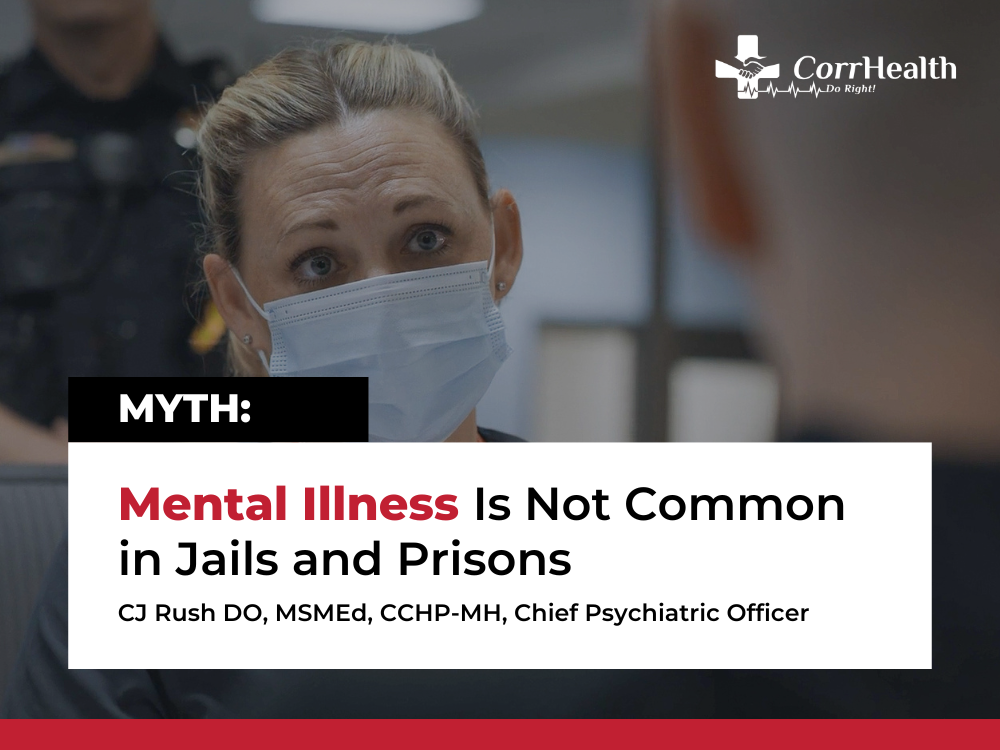The existence of mental illness in America’s jails and prisons is a critical, often misunderstood issue. There are many myths surrounding the occurrence of serious mental illness in carceral settings. One persistent myth claims mental illness is rare among incarcerated individuals. Unfortunately, the reality couldn’t be further from the truth: The healthcare challenges related to caring for those with a serious mental illness are not only common but disproportionately affect those behind bars. CorrHealth’s mission to “Do Right” drives us to expose this myth, as well as others, that are present in the field of corrections. This article explores the scope of mental illness in correctional facilities, dispels misconceptions, and underscores the urgent need to reduce false beliefs and remove the stigma and barriers to high-quality care for this highly underserved population.
Mental Illness: A Prevalent Issue in Correctional Facilities
Mental illness is far from rare in correctional facilities—in fact, it’s significantly more common than in the general population. According to several studies and national reports, approximately 44% of people in local jails and 37% in state and federal prisons have a history of mental illness [1][2][3]. That’s more than double the rate seen among U.S. adults in the community, where only about 18% report any form of mental illness [2].
Diagnosed Disorders and Suffering
Even more concerning is the high percentage of incarcerated individuals living with serious mental illnesses (SMI) such as schizophrenia, bipolar disorder, or major depressive disorder. Roughly 20% of jail inmates and 15% of state prisoners suffer from these conditions [4][5][6]. The rates are even higher among women, with studies showing that 31% of female jail inmates have a current and serious mental health condition [6].
Contrary to the myth that mental illness in correctional settings is minimal or manageable, the reality is that these individuals present with complex, long-term psychiatric conditions. Major depressive disorder is the most frequently reported diagnosis, affecting 27% of state prisoners, while other common conditions include bipolar disorder, anxiety disorders, and unspecified psychosis [7][8][9].
“Mental Illness Is Not Common in Prisons…”
Unfortunately, many of these illnesses go untreated or are under-treated while individuals are incarcerated. This can lead to rapid deterioration, victimization by others, and heightened risk of self-harm or suicide [12]. These challenges are compounded by the fact that most jails and prisons were never designed to serve as psychiatric institutions. Despite this, they have become the de facto mental health system in the U.S.—housing more individuals with SMI than any psychiatric hospital in the country [1][4].
Correctional healthcare professionals face numerous hurdles in delivering adequate care. Limited resources, restricted access to specialty providers, and the highly secure and stressful environment all contribute to reduced continuity of care [10][11]. Stigma—both from within and outside the facility—further prevents many individuals from seeking the help they need. Some may fear being labeled or isolated, while others are unaware that treatment options even exist [12][13][14].
Perhaps most alarming is that an estimated 63% of incarcerated individuals with a history of mental illness do not receive treatment during incarceration [1]. The consequences of this treatment gap are profound. Without intervention, mental illness can worsen in jail or prison, contributing to behavioral infractions, disciplinary action, longer periods of incarceration, and increased suicide risk [12].
Addressing the Issue
Dispelling the myth that mental illness is uncommon in corrections is about more than setting the record straight—it’s about prioritizing solutions. Mental health experts and advocacy groups alike stress the importance of comprehensive screening, proper psychiatric care, diversion programs, and community-based support for justice-involved individuals [1][2][12]. These efforts can significantly improve health outcomes, reduce recidivism, and alleviate the burden on correctional institutions that were never designed to act as mental health providers.
Incarcerated individuals are among the most vulnerable members of our society. Acknowledging the widespread presence of mental illness in jails and prisons is a necessary step in dismantling stigma and ensuring that every individual receives the care and dignity they deserve.
Dr. C.J. Rush D.O., M.S.(MedEd), CCHP-MH
Chief Psychiatric Officer
Sources:
[1] Mental Health Treatment While Incarcerated https://www.nami.org/advocacy/policy-priorities/improving-health/mental-health-treatment-while-incarcerated/
[2] About Criminal and Juvenile Justice & Behavioral Health | SAMHSA https://www.samhsa.gov/communities/criminal-juvenile-justice/about
[3] Confronting the Mental Health Crisis in Prisons and Jails https://www.mcleanhospital.org/essential/incarcerated-mh
[4] Serious Mental Illness Prevalence in Jails and Prisons https://www.tac.org/reports_publications/serious-mental-illness-prevalence-in-jails-and-prisons/
[5] [PDF] Serious Mental Illness (SMI) Prevalence in Jails and Prisons https://www.tac.org/wp-content/uploads/2023/11/smi-in-jails-and-prisons.pdf
[6] Prevalence of serious mental illness among jail inmates – PubMed https://pubmed.ncbi.nlm.nih.gov/19487344/
[7] Indicators of Mental Health Problems Reported by Prisoners https://bjs.ojp.gov/library/publications/indicators-mental-health-problems-reported-prisoners-survey-prison-inmates
[8] The Prevalence of Mental Illnesses in U.S. State Prisons https://pmc.ncbi.nlm.nih.gov/articles/PMC4182175/
[9] Prevalence of severe mental illness among people in prison across … https://www.sciencedirect.com/science/article/pii/S2468266724002809
[10] [PDF] Mental Illness in Correctional Populations: The Use of Standardized … https://www.uscourts.gov/sites/default/files/70_2_5_0.pdf
[11] [PDF] Schizophrenia Myths – CSUN http://www.csun.edu/afye/documents/Schizophrenia-Myth-Busters-H-Boruck.pdf
[12] Prison and mental illness: Five myths and some solutions https://www.irishexaminer.com/opinion/commentanalysis/arid-41571817.html
[13] Misconceptions About Working in Correctional Psychiatry https://jaapl.org/content/early/2020/02/12/JAAPL.003921-20
[14] Misconceptions About Working in Correctional Psychiatry – PMC https://pmc.ncbi.nlm.nih.gov/articles/PMC11581425/
[15] Unjust Punishment: The Impact of Incarceration on Mental Health https://nysba.org/unjust-punishment-the-impact-of-incarceration-on-mental-health/
[16] Mental health | Prison Policy Initiative https://www.prisonpolicy.org/research/mental_health/
[17] Incarcerated Populations and Healthcare: Myths and Facts https://news.cuanschutz.edu/news-stories/incarcerated-populations-and-healthcare-myths-and-facts
[18] [PDF] Violence and Mental Illness Myths and Reality https://www.ncsc.org/__data/assets/pdf_file/0030/85098/Violence-and-Mental-Illness-Myths-and-Reality.pdf
[19] 3 Mental Health Myths in Criminal Justice | King University Online http://online.king.edu/news/3-mental-health-myths-criminal-justice/
[20] Mental Illness and Prisoners: Concerns for Communities and … https://ojin.nursingworld.org/table-of-contents/volume-20-2015/number-1-january-2015/mental-illness-and-prisoners/






